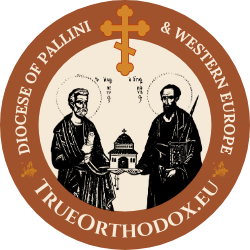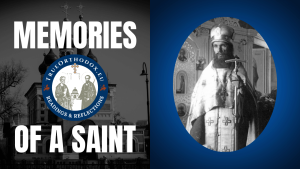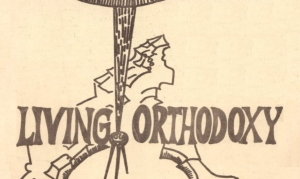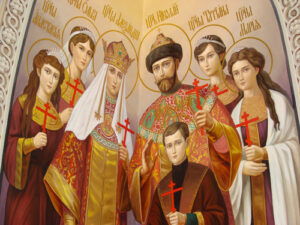The Restoration of the Orthodox Way of Life by Archbishop Andrew of New-Diveyevo
I. THE BATTLE TO PRESERVE THE ORTHODOX WAY OF LIFE
I GREW UP in a pious family… I was surrounded by that Orthodox way of life which for generations had been created by Holy Russia. In our family, life proceeded according to the church calendar, according to the yearly church cycle. Feast days were as it were the signposts of life. At home there were constant Divine services, and not only molebens, but all-night vigils also.
A strong impression was made on me by the early-morning Divine services, to which our mother took us and to which we went no matter what the weather, fall and winter: After these Divine services one always felt a kind of extraordinary inspiration, a kind of quiet joy.
Our family was wealthy… And the religious outlook with which our life was penetrated was naturally reflected in deeds also: we participated in the building of churches, set out tables with food for poor people, sent donations to prisons, hospitals, work-houses.
Of course, there were also sorrows, and illnesses, and deaths. But they also were accepted in the light of Christ. The awareness that “Christ is risen, and the life of man will be in the Resurrection of Christ” helped us to bear our misfortunes and reverses. Everything was experienced lightly and joyfully, without the strains so characteristic of many people.
This feeling of joy, this Christian way of life, were characteristic not only of our family, but also of the society which surrounded us.
After the Revolution of 1905, in place of the hopes and agitations there came disillusionment and desolation. People became as it were closed in on themselves. They were occupied with empty things, with little egoistic interests, visits, concerts, the theater. In human relations dryness and officialness reigned.
And I [attending the St. Petersburg Polytechnical Institute], coming up against this cold alienation, this desolation, for the first time experienced a feeling close, if not to despair, then to despondency, and my soul cried out: “I cannot.” Why did my soul cry out? Why did this cry burst out — “I cannot”?
I felt that I could not live as people around me were living. I felt that I was lacking that life, that Orthodox WAY OF LIFE, which had surrounded me in my childhood and youth, that lightness of heart which I felt. I had the impression that I had been deprived of the air which I had breathed.
I had to have life. And I began to seek…
[The lectures on Dostoyevsky of a certain professor] revealed sides of life which I had somehow not recognized earlier… I became acquainted with a Christian student group. But this group did not satisfy me. It was interconfessional. But I, raised from childhood in the conditions of the Orthodox way of life, needed precisely the confessional way; I needed the Sacraments, the feeling of sanctification, prayer.
All this was given to me by Archpriest John Egorov… He became the leader of a group of students who had left the Christian student group. I spent five years in his “school,” where there were 25 of us students, and for me there was opened up the elemental reality of the life of Christ’s Church, by which Holy Russia had lived. I understood that the Divine services are not merely a ritual, but that in them are revealed the dogmas of faith. They are the foundation of man’s reception of Divinity.
Then, the examination and study of the works of the Fathers of the Church and the Patristic writings revealed to me the paths of life.
When I had gone through the whole course taught by Fr. John, I had literally come back to life. I sensed the elemental power of Orthodoxy, I sensed. that air of life which it gave. I understood in what this life consisted. I came to know that freedom of conscience which we receive through the Sacrament of Repentance.
After this preparation I came, in fact, upon an Elder — Fr. Nectarius, disciple of the great Elder Ambrose of Optina… Elder Nectarius showed me my path, the path of pastoral service, and prepared me for it with the help of his disciple, Fr. Vincent. He taught me that the confession of faith must be in godliness. The Divine must enter into every side of our life, personal, family, and public. And so in 1921 my pastoral activity began in my native Romny…
I was soon deprived of my flock and sent to Kiev under surveillance. There it was very difficult for me at first, but then I became close to a group of outstanding Kiev pastor-ascetics, who became my instructors and friends. Their activity and battle for human souls took place during the frightful time of the reveling of the atheists, against a background of demonic carnivals, in the heat of persecutions against the Church and believers, of massive arrests and executions. And all of them gave up their lives for what was already in my heart — for the quiet which I had experienced in childhood, for inward life, for strengthening oneself in faith, for the Orthodox way of life, for Holy Russia.
God had mercy on me then and delivered me from prison. On my shoulders lay the heavy responsibility to continue the work of the martyred ascetics…
The Germans came to Kiev… Churches were opened. The Lord helped us to re-establish the Protection Hospital Convent, in the church of which I became priest. Again one had to help people, feed them. We managed to reestablish the hospital, a home for the crippled and aged. But the famine was not only bodily, but spiritual as well. People who had been starved for the Church, for the Orthodox way of life, streamed into the churches. One had to quench their hunger. Then, after two years under the German occupation, we had to throw everything over and be evacuated. The Soviets came.
Together with a group of people close to me, I ended up in Berlin. I was assigned as chief priest of the Berlin cathedral. For the course of nearly two years, under ceaseless bombings, Divine services were celebrated every day in the cathedral. The Lord helped us to preserve the Divine gift of the Eucharist of Christ so as to strengthen and confirm in faith the souls of our Russian people who had fled from Communism or had been brought by force to Germany. The church was constantly filled with Russian youth, who for the most part knew neither their homeland nor God nor the Orthodox way of life, but now instinctively were drawn to the Church, to Christ. One had to help them, caress them, teach them, instruct them.
But the war was approaching its end. Again one had to be evacuated — this time to Wuertemberg, to the small town of Wendlingen. There, in the difficult period which set in after the capitulation of Germany, being in constant fear of repatriation, our small group, under my guidance, erected a church and immediately instituted the great Sacrament of the Divine Eucharist. And we began again to create a quiet order of life, to create the Orthodox way of life. The Divine services were celebrated daily, life proceeded in godliness from Sunday to Sunday, from feast to feast. All around there blustered passions, animosity, an animal-like battle for survival. Many began to look on us as naive people who were not living in accordance with the times. But we lived, lived in Cod. Little by little the attitude towards us changed. Pilgrimages began. People who had gone to the depths of despair found peace of soul and a quiet joy with us and went away enlightened and calmed.
And then a new move — to America. And again one had to begin everything from the beginning. In the autumn of 1949 Archbishop Vitaly [of Jordanville] and Archbishop Nikon entrusted to me the establishment of a women’s monastery wherein to gather together nuns scattered in various countries of the Diaspora, and to establish for them the quietness of Christ and the Orthodox way of life. This assignment seemed beyond our powers… But the idea of establishing here, in America, a little corner of the Orthodox way of life, saturated in that elemental power of spirit by which I had lived and breathed since childhood, took hold of me, and I agreed, trusting in the help of God. And the Lord did not abandon us.
Nuns were gathered together. About a thousand D.P.’s were brought over from Europe, of whom a significant number settled around the monastery and formed, so to speak, a large Orthodox family… Most important, the Lord helped to create in New-Diveyevo that which had filled my soul from childhood. In the conditions of emigration, when the Russian people, confused in the midst of foreign conditions of life and non-Orthodoxy, were caught in the whirlpool of fate, the Lord helped us to establish in New-Diveyevo the Orthodox way of life, a church atmosphere of the quietness of Christ and of godliness; to establish Holy Russia in a foreign land.
But it is not yet enough to establish a monastic life; one must preserve it. For there is always the danger that life can be converted into a hothouse, a greenhouse, where it will be supported by artificial warmth, and as soon as the source of warmth ceases to operate, life will perish.
Therefore, there must be a constant source of life. Just as the earth and its vital juices constantly nourish vegetation, so our life also must be ceaselessly nourished by that elemental power which the Church of Christ gives, which is incarnated in the Orthodox way of life, in the Divine services, in, fastings, in prayers, in vigils, in all that which embodies our Holy Russia. This is the elemental power which places in the mouth of the man who is leaving his earthly existence the last words, “Into Thy hands I commend my spirit,” and gives him the possibility to depart into eternal existence with the name of Christ.
II. HUMANISM VERSUS TRUE CHRISTIANITY
IN AMERICA there is no Stalin, no Communism, no persecutions against the Church. Therefore, emigrants who do not know actual spiritual life might think that Orthodox life in America should be an ideal of Orthodox life and that one should live just as the old Russian emigrants live here. But have our Russian emigrants found here what is the true ideal of the Christian — godliness, the acquirement of peace of heart through repentance? Have they found that elemental reality which the Church should be and with which a man departs into eternal life — sanctity, purity, sobriety?
Alas, it seems to me that the life not only of non-Orthodox Americans, but of Orthodox Russians as well proceeds not according to the laws of the Church, but according to the principles of humanism. Very many of those who consider themselves Orthodox are actually Christians only in form, but they live according to their own understanding, complying only with the commands of their flesh. American life, with its satiety and comfort, acts extraordinarily in favor of the acceptance of humanism. And therefore it is not astonishing that laymen often make demands to their pastors to go “in step with the times,” and the pastors often fulfill these demands…
But the religious-moral foundations do not change; why, then, should priests change? Against contemporary man the same temptations, the same passions and seductions battle that tempted men a thousand years ago. Sin remains sin forever, and not a jot or tittle of the law of Christ changes: “Heaven and earth will pass away, but my words shall not pass away. Seek ye first the Kingdom of God and its righteousness, and all else will be added unto you.”
The most important thing is to create a pure heart and keep it that way. Here there can be no talk of reforms. The Lord Himself has already given us everything needful in His Church.
But here the question arises: how can we apply to ourselves this wealth given by the Lord? Let us turn to the history of the Church at the time when humanism was striving to supplant true Christianity and replace it with an outward, false Christianity {the 18th century}. Then it was that the Lord raised up a hierarch who gave us for our life the method of true Christianity. In the True Christianity of St. Tikhon of Zadonsk you will find everything needful for the inward life of man. St. Tikhon speaks of the Word of God, which must be incarnated in life, of spiritual wisdom, of the human heart, of sin, of repentance, of Christian good deeds, of the Holy Church, of the duties of a Christian.
In our emigrant epoch humanism manifests itself with fearful power. Our church life proceeds for the most part outwardly; inward life is being forgotten. The slogan of humanism in our times is again: “Appear to be a Christian, but live according to the laws of the flesh,” and involuntarily we ask ourselves the same tormenting question, which stands always before us: What should we do? The work of St. Tikhon, On True Christianity, is the answer to this question.
This work of St. Tikhon became the foundation of my whole pastoral life. In 1921, in blessing me for pastoral work, Optina Elder Anatole told me: Take the True Christianity of Tikhon of Zadonsk and live by its directions.”
III. GODLINESS: TO KEEP WHAT IS GOD’S IN HONOR
WHAT TO DO? With such a question I appealed in 1921 to an Optina Elder…. After going through the frightful revolutionary years of 1917, 1918, and 1919, when everything was collapsing and being destroyed, I came to a state which was simply pathological: why fight when everything is coming to an end? My outlook was transmitted to my close ones. The Revolution, the chaos as it were confirmed my words for those around me.
I became a priest, but the condition of my soul remained the same. And thus it was that I went to Optina to the Elder with the question: What to do?
The most important thing the Elder {Nectarius} told me was this:
“The Church of Christ goes as it were on a railroad track. The path. of the rails is known, it is defined, but you and I must pay attention to what happens in the coach which is on the rails. In the coach occurs the personal life of a man. A man goes in and goes out of the coach, and there will be an end, to the rails, but the end of each person is separate: one leaves the coach earlier, another later, and here it is that Christian godliness is necessary.
“The dogmas of faith, faith itself is revealed to us, and none of us doubts it; but the confession of faith must be in godliness. ‘No one is good: save God alone’ — this is to hold what is God’s in honor. It is the Divine that must be our concern; it must enter into all sides of our life. personal, family, public. Godliness is disclosed to us by the daily Divine services. At the daily Midnight Service is read the 17th Kathisma, which is a disclosure of God’s Righteousness by the Prophet David to his son Solomon. And the Church offers the 17th Kathisma in order to reveal our inward being. One of the methods for godliness is given by the Holy Church in a spiritual exercise which trains our mind to the remembrance of the Name of God — ‘Lord Jesus Christ, Son of God, have mercy on us.’ Monastics are given a prayer-rope, but for a priest in the world the prayerful remembrance of his spiritual children can serve for training in the remembrance of the Name of God.”
And so: What to do? The Elder said: “Live in such a way that what is God’s will be in honor; and the first, the chief thing is your mind, which must be in God.”
IV. EXHORTATION TO SOLZHENITSYN
“For a hundred years Noah called people to him, but only the dumb animals came.”
Elder Nectarius of Optina
On July 22, 1975, the Russian writer A. I. Solzhenitsyn visited Archbishop Andrew in New-Diveyevo Convent and talked with him for more than an hour. Archbishop Andrew greeted Solzhenitsyn, who was then already known world-wide for his flaming anti-Communist talks, with the following brief address:
DEAR, deeply-respected Alexander Isaevich:
I have thought much, and am. thinking much, about you; and involuntarily, while thinking of you, there arise before me two places in Sacred Scripture. One is from the Old Testament: the image of righteous Noah. It was revealed to him by God that there would be a world-wide flood which would destroy all those who remained in ungodliness. But for the salvation of those who would remain in godliness, those who still preserved all that is God’s in honor, God commanded Noah to build an ark. And Noah began to build an ark, and at the same time to call the people to repentance…
But the sky was clear, not a cloud; the whole of nature, as if indifferent to the sins of men, remained solemnly quiet. Men heard Noah, but shrugged their shoulders and went away. The building of the ark was finished, but only the family of Noah entered it. They entered the ark, not yet to escape the flood, but to escape the ungodliness which was everywhere… And finally the rain came; the water began to rise and inundate everything. Now the frightened people hastened to the ark, but the doors closed by themselves, and no one else was able to enter…
Thinking of you, I involuntarily presented to myself this magnificent figure of Noah calling the people. Thus you also, my dear one, are calling people from the ungodliness of Communism! They hear you, they applaud you. They heard Noah also and, it may be, expressed their enthusiasm. Yes, they heard… but they did not obey, and perished!
Noah called men from something, from ungodliness. But he also called them to something: to godliness, and to a concrete godliness: to the godliness which was in the ark! And here I recall another place in the Sacred Scripture, the Epistle of the Apostle Peter: This they willingly are ignorant of, that by the word of God the heavens were of old, and the earth made of the water and in the water: whereby the world that then was, being overflowed with water, perished. But the heavens and earth which are now, by the same word are kept in store, reserved unto fire against the day of Judgment and perdition of ungodly men (II Peter 3:5-7).
If all this is to be destroyed thus, then what a holy life and godliness must we have! This is what the New Testament Ark is: godliness, preserving what is God’s in honor!
In your recent address you said that you were born a slave. That means that you were born after the Revolution. But I saw everything that happened before the Revolution and what prepared it — it was ungodliness in all forms, and chiefly the violation of family life and the corruption of youth… With grief I see that the same thing is happening here also, and indeed in the whole world. And it seems to me that your mission also is — to call people from ungodliness to godliness!
And the source of godliness is Christ!
Source: Orthodox Word, Vol 63, 1975, St Herman of Alaska Brotherhood, Platina, California








